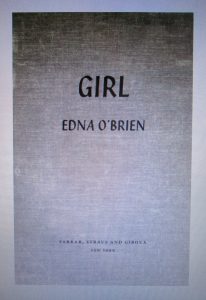Late last year, at the age of 89, famed Irish novelist, memoirist, playwright, poet, and short story writer Edna O’Brien, published her forty-fifth work, a novel titled Girl.
Girl is the fictionalized story of one Nigerian schoolgirl, whom O’Brien has named Maryam, who is among a group of other girls abducted by the Islamic militant group Boko Haram, raped, imprisoned, and enslaved. Maryam, however, ultimately manages to escape, along with her baby daughter, Babby, fathered by one of the jihadist fighters.
Maryam’s journey back to her village is relentlessly harrowing. And when she finally reaches her village, instead of being welcomed home, she and her child are treated as outcasts. (It is a wonder – and a tribute to O’Brien’s vivid imagination — that the story has a hopeful ending.)

This is a difficult book to read, I found; but it is necessary, I feel, to help understand this true-life horror story. Reading about Boko Haram in the news, it’s easy to wince and turn the page. After reading this novel, however, which brings the heartbreaking headlines to life, you cannot forget.
According to an interview with O’Brien by Sean O’Hagan in London’s The Guardian newspaper last August, O’Brien got the idea for Girl while reading a newspaper report about a girl who was found wandering in a Nigerian forest.
“Every day the newspapers are full of novels waiting to be written,” O’Brien told O’Hagan, but this small item resonated for her. “The girl had escaped her captors, but she had lost her mind and she was carrying a baby. I could not have written this novel if the violence and injustice done to this young woman and many others hadn’t been molded on to my self and my soul.”

Writes O’Hagan, “Girl is unlike any of [O’Brien’s] novels that preceded it […] the style [is] spare and restrained, the terrain unfamiliar, a world away from the landscape and discontents of her native Ireland.”
To write Girl, O’Brien, then in her late-eighties, traveled from her home in London to Nigeria twice, for extended periods, to speak with victims, doctors, aid workers and local journalists. And, through her contacts, she met the girls whose survivor’s stories she absorbed and then transformed into the novel’s single narrative told in Maryam’s voice.
In her sixty-year writing career, O’Brien has been no stranger to controversy, I learned. (Her first novel, The Country Girls [1960], was banned by the Catholic Church, for example.) And this her newest novel, it appears, may bring her more controversy, coming as it is at a time when “cultural appropriation” – the act of taking or using things from a culture that is not your own — is a highly charged topic in literary circles.
(See all the recent controversy around the new novel, American Dirt, a book about Mexican migrants that I have yet to read and therefore cannot take a fully informed stance on.)
But O’Brien has a response regarding her Girl. As she told O’Hagan, “It has been suggested to me that as an outsider I am not eligible to write this story. I do not subscribe to that devious form of censorship. Theme and territory belong to all who aspire to tell it and the only criteria is the gravity in the telling….”
In my own small experience with this form of approbrium — as a person who has lived and worked for eight-plus years on the ground in various countries in Africa and has written and published four books about my experiences in Africa and the remarkable African women and men I came to know there – I stand with O’Brien.
It’s been sad for me to find that many Americans, and not just African-Americans, don’t trust the words of an older, white, American woman (like me) when it comes to writing about Black lives. They seem to suggest: What could you possibly know? My response: I know I have stories well worth sharing, true and enlightening stories you would enjoy reading, if you’d only care to read them.
At the end of her review of Girl in the New York Times last October, Francine Prose, summed up O’Brien’s cultural appropriation issue nicely, I think:
“Let’s give O’Brien credit for her energy and passion, for reminding us that at every moment girls are being abused and exploited with unconscionable cruelty and malice. Let’s honor her for the grit that inspired her, a woman in her 80s, to travel to Nigeria to listen to people’s stories. We’re still hoping for that book by the Chibok [Nigerian] girl, but in the interim we should celebrate Edna O’Brien for the skill with which she makes us care.
“Surely it’s better to be mindful of the suffering humans inflict on one another, around the world and within our borders, than to distract ourselves with the pleasures of our comfortable lives and forget the crimes that have happened and continue to happen as we wait for the witness, the survivor, the ideally suitable person to tell us the harrowing truth.”
